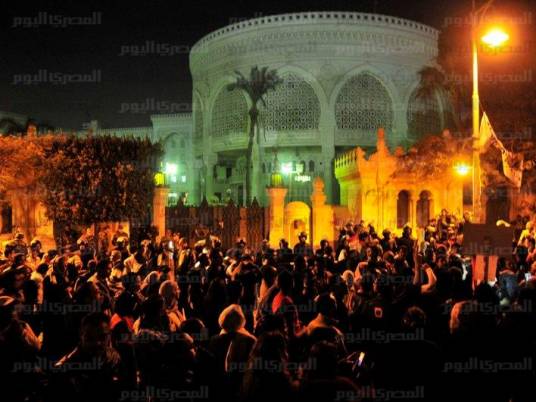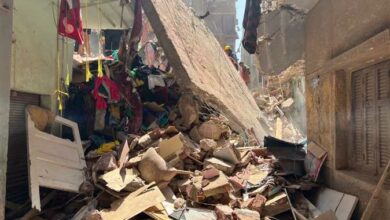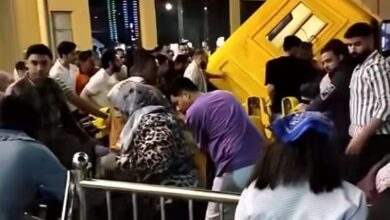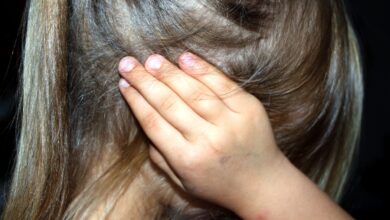
A 7000 page investigations document of the violence that took place at the Presidential Palace in December 2012 revealed a prosecutor’s attempt to interrogate deposed President Mohamed Morsy at his place of detention and Morsy’s alleged refusal to sit with the prosecutor.
The prosecutor had to wait three hours for Morsy to see him. He then tried to persuade Morsy to answer questions only to be refused.
“I am the legitimate president and I have immunity,” Morsy told the prosecutor.
The prosecutor then posed 20 questions to Morsy pertaining to security forces forcibly breaking sit-ins and about him inciting his Brotherhood followers to attack demonstrators with firearms and edged weapons.
According to the investigation records, the following questions were some of the questions asked during the interrogation:
Q: What is your response to the charge that you, as president, ordered the security forces to break the demonstrations outside the Ittihadiya presidential palace by force?
A: The accused refused to answer.
Q: What is your response to the charge that you, as president, instructed the Muslim Brotherhood to assault demonstrators outside the palace?
A: The accused refused to answer.
Q: You are accused of inciting your followers and aides to premeditated murder. What do you say to that?
A: The accused refused to answer.
Q: You are accused of inciting your followers and aides to commit violence, bullying, and possessing firearms, ammunition and bladed weapons. What do you say to that?
A: The accused refused to answer.
Q: You are accused of instructing your followers and aides to arrest and torture peaceful demonstrators. What do you say to that?
A: The accused refused to answer.
Q: Were you aware of the clashes outside the palace between your followers and your opponents who objected to the constitutional declaration that you had issued?
A: The accused refused to answer.
Q: Were you aware of how the peaceful protesters outside the palace were dealt with?
A: The accused refused to answer.
Q: Did you know your followers arrested protesters and detained them in a room adjacent to the palace?
A: The accused refused to answer.
There were 50 pages of evidence that allegedly incriminated 15 people of committing acts of violence and inciting murder and bullying outside the Presidential Palace on 5 December last year. They were all referred to a criminal court. In addition to Morsy, the 15 defendants were:
Leading Brotherhood member Essam al-Erian; deputy head of the Freedom and Justice Party, Asaad al-Sheikha; former deputy of the chief of presidential staff, Ahmed Aty; former director of the president’s office, Ayman Abdel Rauf; and former advisor to the president, Alaa Hamza.
The remainder included Abdel Rahman Ezz, Ahmed al-Moghir, Gamal Saber, Mohamed al-Beltagy, Wagdi Ghoneim and four others.
Investigations revealed that the accused were involved in the events at the Presidential Palace that resulted in tragic deaths and injuries. The incident was also broadcast live on satellite channels and in other media.
Investigations allegedly revealed that mass groups went to the Presidential Palace to peacefully protest Morsy’s constitutional declaration. The investigations also revealed that Morsy asked the commander of the Republican Guard and the interior minister several times to disperse the protest.
When they refused to do so in order to save the lives of the protesters, Asaad al-Sheikha, Ahmed Aty and Ayman Abdel Rauf mobilized their supporters to disperse the protest by force, while Essam al-Erian, Mohamed al-Beltagy and Wagdi Ghoneim publicly incited the breakup of the protest by force through media.
Investigations revealed further evidence that the accused and their supporters attacked the peaceful protesters, burned their tents, and fired live bullets at them, killing journalist al-Husseiny Abu Deif. He suffered a fatal head wound. They also wounded several others, terrorized them, arrested 54 protesters and detained and tortured them next to the palace fence.
Prosecutors charged Morsy with inciting his supporters and aides to premeditated murder, violence, bullying, possession of firearms, ammunition and bladed weapons, and arresting and torturing peaceful demonstrators.
They also charged Essam al-Erian, Mohamed al-Beltagy and Wagdi Ghoneim with inciting the same crimes through the media. Asaad al-Sheikha, Ahmed Aty, Ayman Abdel Rauf and the rest of the accused were charged with carrying out the crimes.
Prosecutor General Hisham Barakat ordered the detention of the accused, currently detained, and the summoning of eight other fugitives. He also sent the dossier of the case to the Cairo Court of Appeal to set an urgent session for their trial.
Prosecutors said the rest of the charges contained in the dossier were photocopied for an independent investigation.
Excluded from the case were:
Refaa al-Tahtawy, the former chief of presidential staff; Khairat al-Shater, the deputy guide of the Muslim Brotherhood; Mohamed Badie, the Supreme Guide; and Mahmoud Ghazlan, a leading figure of the group.
They were excluded as they will face charges soon to be announced.
Edited translation from Al-Masry Al-Youm




